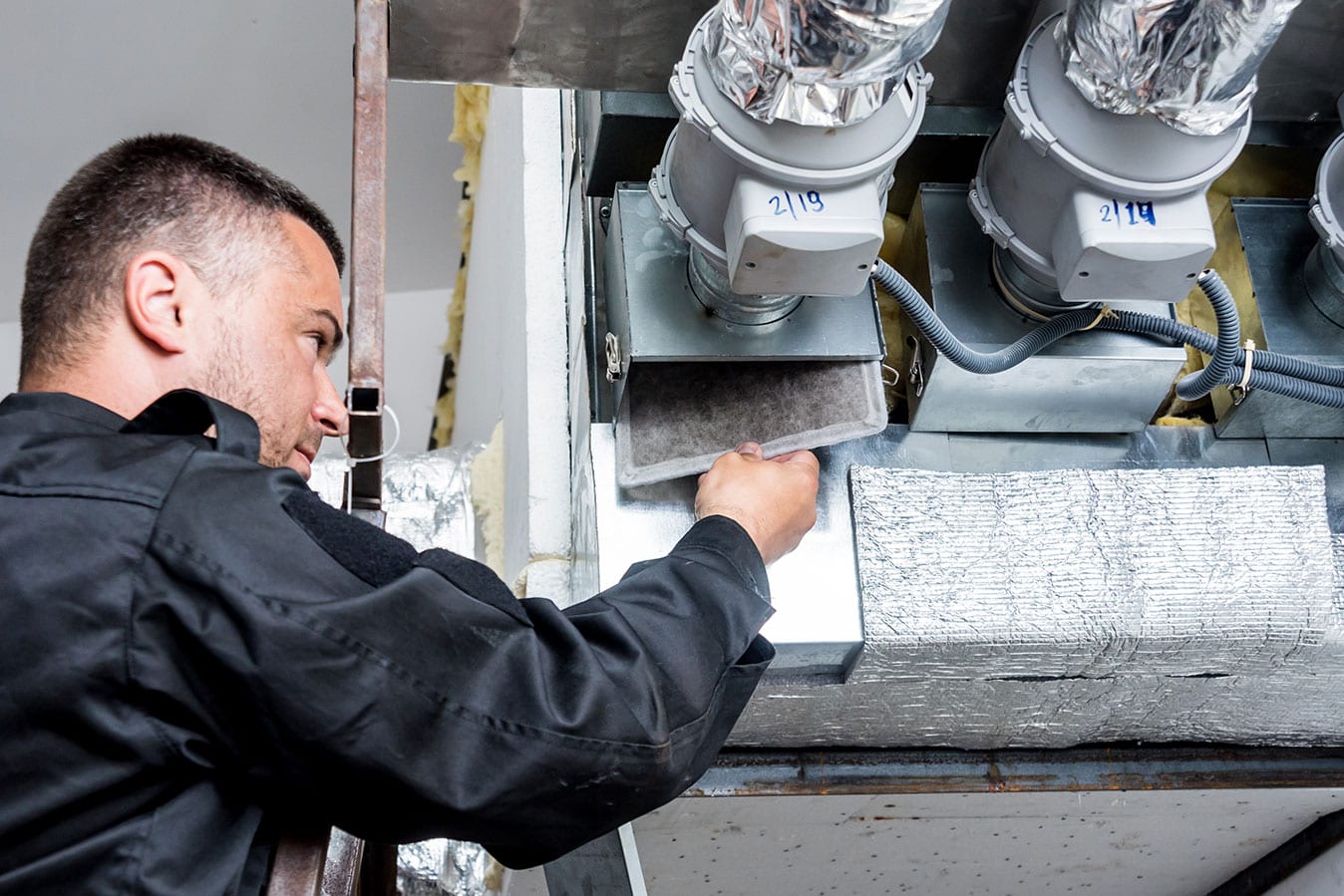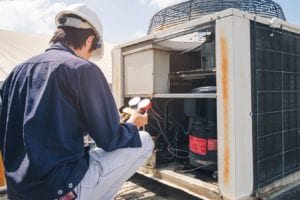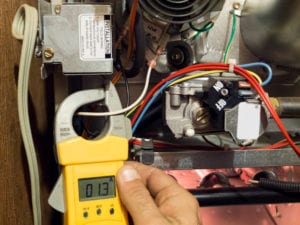
HVAC maintenance is crucial to keep your heating and cooling system at their best year-round. But what does a maintenance visit include? The guide below explains what you can expect before scheduling a tune-up and the benefits it offers.
Table of Contents
Why Is HVAC Maintenance Important?
Heating and cooling systems require regular upkeep to provide your home with comfortable, healthy air year-round. Simple tasks, such as filter replacement, can improve your system’s efficiency. Scheduling routine HVAC maintenance helps maintain your unit’s efficiency, allowing you to save money on energy costs every month.
Routine maintenance can also extend the life of your heating and cooling system, preventing major mechanical issues that often lead to extensive repairs or premature replacement. By avoiding the need for repairs or a new HVAC system, you’ll save money in the long run.
Performing routine HVAC maintenance also keeps your system’s warranty valid. It’s crucial to have a trusted professional perform maintenance to retain the warranty. If your system sustains any damage after DIY maintenance or repair, you’ll likely have to pay out of pocket to resolve the issues.

What’s Included in the Maintenance Appointment?
Every HVAC maintenance appointment contains two key components: inspection and cleaning. The inspection portion allows an HVAC technician to evaluate the safety, efficiency, and overall condition of the heating and cooling system. The cleaning aspect enhances efficiency so the unir can operate under less strain and condition the air in your home more efficiently.
During a tune-up service, the technician conducts an inspection by checking the following:
-
Verify Thermostat Functions, Settings, and Location
Ensure the accurate operation of your thermostat based on its type.
-
Inspect Filter, Replace or Clean if Necessary
We provide a 1” filter with each inspection to maintain optimal system performance.
-
Brush Clean Evaporator Coil
Enhance airflow and maximize cooling efficiency by keeping the evaporator coil clean.
-
Rinse Evaporator Coil with Anti-Bacterial Solution
Prevent bacterial growth for improved indoor air quality.
-
Clean Drain Pan
Eliminate algae buildup to prevent odors and drain obstructions.
-
Flush Condensate Drain Line
Prevent water damage and system failure by addressing clogged drain lines.
-
Check Blower Wheel
Inspect for dirt and mildew buildup, which can lead to insufficient airflow and motor failure.
-
Monitor Blower Motor Amperage
Detect potential motor failure or electrical issues within the system.
-
Measure Temperature Differential
Ensure maximum performance by testing the temperature difference from the return to the supply of your system.
-
Conduct Airflow Pressure Test
Detect and address high or low air pressure to prevent uneven heating/cooling and premature motor failure.
-
Check Heat Strip Amperage
Verify that heat strips are drawing the correct amount of electricity and functioning properly.
-
Test Defrost Board
Examine the crucial “brain” of any Heat Pump for loose connections, burns, or shorts that may affect system operation.
-
Inspect Refrigerant Levels
Ensure proper refrigerant charge for efficiency and maximum cooling capacity.
-
Tighten Electrical Connections
Address loose connections to prevent wire burning and system failure.
-
Clean Condenser Coil
Maintain proper airflow and heat exchange for maximum efficiency by cleaning the outdoor coil.
-
Remove Debris from Condenser
Eliminate leaves and organic matter to prevent corrosion and refrigerant leaks.
-
Monitor Compressor Amperage
Ensure proper operation of the heart of your Heat Pump or A/C to prevent expensive replacements.
-
Measure Outdoor Fan Motor Amperage
Detect improper amperage as a sign of motor failure or other electrical issues.
-
Check All Capacitors
Essential to the proper operation of major motors within your system.
-
Verify Fan Blade Alignment
Ensure proper alignment to prevent fan motor overamping, unnecessary noise, and vibration.
-
Examine All Electrical Relays
Address burnt or shorted relays that can fail to send proper voltage to other components.
Each of these pieces plays a crucial part in your systems operation. Technicians should assess the condition of each one to ensure the system works properly.

Benefits of HVAC Maintenance
Routine HVAC maintenance ensures efficient and long-lasting performance, reducing energy consumption and lowering utility bills.
It extends the lifespan of your system, minimizing the risk of costly repairs or replacements. The financial benefits lead to long-term cost savings, making it a wise investment. Beyond finances, regular maintenance enhances indoor comfort and air quality, addressing issues like dust and allergens.
This proactive approach provides benefits such as lower energy bills, warranty protection, breakdown prevention, safety assurance, and peace of mind, ensuring a reliable and efficient HVAC system.
Why Hire a Professional for Heating and Cooling System Maintenance?
It’s possible for handy homeowners to perform an inspection. But unless you have sufficient training, it’s best to leave this task to the professionals. Licensed HVAC technicians understand the complexities of different HVAC systems. Amateurs may think something is normal, but a professional can identify something wrong with the system when they perform routine maintenance.
Qualified professionals work with safety as a top priority. Attempting to clean your system on your own can result in an injury if you aren’t careful. Save time by trusting an HVAC specialist with the job.
Choose Fenwick for All Your Maintenance Needs
When you need local heating and cooling maintenance, turn to the experts at Fenwick Home Services. We specialize in HVAC maintenance, repairs, and installation so you can live comfortably.
Book an appointment through our online form, or call (904) 867-2798 to request immediate service.

